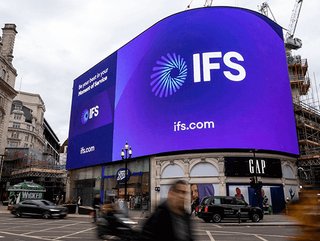The Importance of ESG Reporting with the CSO of IFS

As IFS’s newly appointed Chief Sustainability Officer, Sophie Graham helps businesses meet their sustainability goals, with a vision of converging technology and sustainability to create a more resilient and responsible future. In this role, she has two core responsibilities. One core focus is to support and oversee the successful delivery of our strategy and goals around ESG, working with executive leadership and owners to scale capability out at pace across IFS’s global operations. In addition to this, she is also responsible for actively consulting with, and advising customers on their goals and requirements around ESG, as well as proactively supporting them on their ESG journey.
Graham has a background in law, and previously worked as Sustainability Strategy Manager at Santander UK, where she was heavily involved in strategy and implementation, and in the wider range of ESG practices.
Prior to that, she was the Responsible Business Lead at Fujitsu EMEIA, boosting sustainability within organisations and across regions. Graham had already been part of a team leveraging corporate responsibility to improve social and environmental outcomes at Fujitsu Americas, where she was Responsible Business Manager.
“At IFS we are making significant progress on an ambitious sustainability agenda that will make us more socially and environmentally responsible, involving every area of the business,” Graham shares.
“We address our own performance, aiming for best practice across our operations, releasing an annual Sustainability Report and ESG Fact Sheet, sharing our progress and long-term ambitions.”
We sat down with Sophie Graham to discuss ESG reporting.
Why is ESG reporting so important in today’s landscape?
ESG goals have raised up the agenda for governments and regulators, so stakeholders, including investors, customers, and consumers are paying closer attention to a company's commitments and actions regarding environmental sustainability, social impact, and progress on governance.
Around the globe, ESG reporting is becoming a mandatory requirement, with increasing alignment in this area between standards organisations, including the International Financial Reporting Standards (IFRS), Corporate Sustainability Reporting Directive (CSRD), Global Reporting Initiative (GRI), and the International Sustainability Standards Board (ISSB). ESG standards are constantly evolving, as the CRSD, for example, will have significant impact across the EU, increasing the number of firms that must comply with it to approximately 49,000 in 2025.
Failing to address the environmental impact of any of a company’s activities can now carry significant risk of reputational damage. Regulation has a ripple effect on stakeholders, suppliers and partners, which is why customers concerned about their own ESG reporting requirements are increasingly seeking suppliers who can demonstrate they are taking steps to improve their own sustainability initiatives.
To be compliant, a business will need a good data foundation for its reporting compliance, and the agility to adjust continuously as regulations change. Businesses are aware they must disclose their supply chain emissions, and that means engaging with the different parts of the supply chain to accurately obtain that data. We should remember too, that ESG reporting encompasses metrics on biodiversity and social impact, as well as carbon emissions.
What does reporting on scope one, two and three emissions actually consist of?
Scope 1 greenhouse gas emissions come directly from sources owned or controlled by an organisation. That could include emissions from fleets of vehicles for example, as well as their industrial or business processes. Organisations can use solutions to monitor the emissions from individual sites in which they operate.
Scope 2 emissions are those arising from the purchase of electricity, steam, heat or cooling.
Scope 3 emissions are in many ways the most challenging, as they result from activities from sources outside those covered in Scope 2, which effectively means those not owned or controlled by the reporting organisation.
In terms of emissions across the supply chain, organisations can prioritise decarbonisation efforts where they can make the biggest difference. It is possible to collaborate with suppliers to reduce emissions and demonstrate community level benefits of supply chain decarbonisation. However, to achieve this, businesses require comprehensive supply chain visibility, extending both upstream and downstream. This visibility is crucial for understanding and mitigating the environmental and social impacts.
How can organisations ensure they’re properly and accurately reporting on their ESG emissions?
This comes down to having access to the right data that measures the correct sources in an accurate and timely way.
Understanding the full scope of ESG goes beyond having access to a few metrics, however. It involves deep supply chain visibility and is often challenging. While boards now grasp the importance of ESG and its "why", the scale of requirements can be daunting.
Organisations need to establish an ESG governance structure that involves cross-functional collaboration, where each department, including procurement, marketing, finance and others, plays a key part in operationalising the ESG strategy. It also involves businesses assessing and addressing any gaps that may exist within their organisational structure, so everyone understands the targets and fully coordinates their activities to achieve them, using standardised metrics to measure progress. Sustainability needs to be embedded within the organisation and not treated as a standalone initiative.

An increasing number of firms now have a chief sustainability officer (CSO) to define and drive sustainability programmes and ensure alignment with the company's overall strategy.
However, many firms are still a little way off being able to recruit a CSO in at board level. This means that for some, the chief procurement officer (CPO), is responsible for helping manage Scope 3 emissions across the supply chain, working with the chief financial officer (CFO), who is responsible for delivering integrated reporting of financial and sustainability information.
Organisations need to implement the right solutions so they can streamline the collection of data from all departments in the same format. This saves time and ensures it is up-to-date. Organisations must also be ready to use data analytics that give them the insights they need to make informed decisions that align with their ESG goals, whether it involves choosing environmentally-friendly suppliers or optimising transportation routes to minimise emissions.
Companies must have accurate data, using solutions that reconcile spending assessments and emissions estimations to provide greater precision and reliability. The integration of AI makes these processes far faster, more accurate and comprehensive, which is a huge benefit when there is a lot of data to handle.
What are the benefits of doing reporting well, especially for those who get ahead of the curve in doing so?
ESG reporting is an opportunity to drive positive change within an organisation of any size. Regulations encourage businesses to re-evaluate their practices, leading to greater efficiency and sustainability.
Organisations can leverage the in-depth data they collect to drive their business forward and contribute to strategic planning. Accurate data forms a foundation for informed decision-making, revealing risks and opportunities for improvement and innovation.
Achieving sustainability and growth are not conflicting objectives. Sustainable practices reduce costs, and ultimately, create enduring growth. For example, if a manufacturing company identifies an opportunity to reduce water usage within its operations, this will have a positive impact on both its ESG reporting and its operational costs.
In conclusion, businesses have a lot to benefit from embedding sustainability into their core operations and leveraging data to drive up efficiency and provide board level transparency.
Businesses can shift their perspective on ESG reporting from a compliance-driven task to an opportunity for sustainable growth and continuing improvement. By focusing on accuracy, risk management, and governance, organisations can harness ESG data to drive better business decisions, cut costs, and secure long-term growth faster than competitors.
******
Make sure you check out the latest edition of Sustainability Magazine and also sign up to our global conference series - Sustainability LIVE 2024
******
Sustainability Magazine is a BizClik brand






